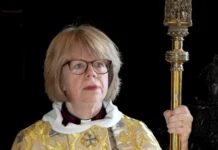Bishop Peter writes: “I am delighted that the Diocese of Sodor and Man is to share with our colleagues in the North-West of England in the creation of a new theological college. Building on the strengths of our current regional providers, we look to implement a new vision for theological education and spiritual formation that will sustain the Church’s ministry into the future.”
The Anglican bishops in the North-West are looking to the future as they announce plans to work towards forming a brand-new independent theological college in the region.
As part of their commitment to providing outstanding formation for lay and ordained ministers, the Anglican bishops for the North-West of England (incorporating the dioceses of Blackburn, Carlisle, Chester, Liverpool, Manchester, and Sodor & Man) commissioned a review of theological training across their dioceses last year. This was conducted by the Rt Revd Graham James, who consulted a wide range of people in the region and beyond.
The NW bishops are deeply grateful for their partnership with St Mellitus College which brought full-time ordination training to the North-West for the first time in over forty years, and for the contributions of All Saints Centre for Mission and Ministry and Cumbria Christian Learning over many years. The Bishops, following Bishop Graham’s report, have a vision for one new integrated college incorporating all this inherited richness and, like a daughter of generous parents, carrying with it a family resemblance of mission-focussed generous orthodoxy with hopeful aspirations for the transformation of the North West.
The Chair of the North-West Bishops, the Rt Revd Julian Henderson, explained: “After prayerful consideration, wise counsel, and under the guidance of the Holy Spirit, the bishops of the North West are overwhelmingly committed to pursuing this exciting vision and so we have committed to working towards forming the new college by September 2021.” The bishops have established a multi-disciplinary implementation team led by the Rt Revd Philip North, together with the Rt Revd Beverley Mason and the Rt Revd Emma Ineson. Bishop Philip said, “this is a once-in-a-generation opportunity to develop a new outstanding theological college in the North-West to serve the Church in the region and beyond.”
The new theological college will replace the existing TEIs and offer part-time and full-time formational, vocational training for lay and ordained leaders of the Church. Bishop Emma noted that the team recognise that change can be unsettling but she stressed that they “are committed to building on the strengths of the three current providers, and the six dioceses they serve, so that the new college can be both an outstanding centre of excellence in theological education, and be better able to respond to the rapidly changing needs of the Church across the region.”
We look forward to working over the current months with current and prospective students to create with them a college which will form the next generation of leaders and ministers for the transformation of the North-West and beyond. We are praying that the College will engender faith, courage, hope and love in all who are formed there.
As part of responding to the needs of the region, the new college will seek to provide pathways for groups that have previously found it difficult to access training. The Bishop of Manchester, the Rt Revd David Walker, notes that “there are many people who are called by God, but who currently find it hard to access the training they need. My episcopal colleagues and I are determined that this new college will enable people from diverse backgrounds to pursue ministry in the Church of England.”
The team have already had discussions with the University of Durham and national Church of England bodies, including Ministry Council and Ministry Team, all of whom have committed to providing staff advisors to the team. Bishop Beverley explained “we want to work collaboratively with all of our partners to ensure that this college is launched on time and on budget, and we have been greatly encouraged by the willingness of those we have engaged with to work with us as we seek to collaboratively construct this new theological college.”
That spirit of collaboration is evident in the theological diversity of the implementation team and the diversity of tradition in the wider team of regional bishops who are supporting this project. Bishop Julian explained that “in this project the North-West Bishops are choosing to embody mutual flourishing by working together across the different traditions of the Church for the sake of mission and ministry in the region.”
The Bishops expect the college to have around 250 students once it is fully operational, which would make it one of the largest theological colleges in the country. Bishop Philip comments: ‘’By bringing together so much of our regional theological training in one place we believe that we will provide unparalleled opportunities for staff and students across the North-West”.




Do it correctly or not at all. It is important clergy know why we believe what we do and the nuances. There is more to church than bishops and priests easily rolling Latin and Greek off the tongue and/or cutting edge hipsters. Each quarter should have mandatory classes in dealing with laity. Learn to minister to the people walking through the door.
Some tips and rules to be taught: 1) Gain 20 parishioners before running 20 off. 2) Don’t hug the women. You will regret it. 3) Don’t give counseling with the petitioner sitting on your lap. You will regret it. Behind closed doors, you will regret it quicker. 4) Never kiss a man on the lips. Ever. 5) Learn to praise properly. Praise the act. Heaping praise on one upsets the 6 that did all of the work. 6) This isn’t about you. If you are having belief issues, drop out now 7) Common sense and professionalism will go a long ways 8) Fight the desire to upgrade the people in the pews. They are wishing for a better priest.
The voice of experience? I hope not! Good points all.
The genuinely faithful Anglican churches should be very wary of accepting any graduates from this new college, as it is being promoted by the Bishops of the CofE. The fact that they bring in someone like Philip North, who does seem to be a faithful and genuine Christian, looks like mere window-dressing.
“That spirit of collaboration is evident in the theological diversity of the implementation team and the diversity of tradition in the wider team of regional bishops who are supporting this project.”
That is what the CofE hierarchy always says, but again it tends to be just for show. Churches must scrutinize the seminaries like hawks, since that is always where the rot starts.
Here in diocese of Sydney we have managed to keep Moore Theological College largely free from attempts by liberals and institutionalists to infiltrate it, and that in turn helps to create a strong diocese (about 270 parishes with ASA of 200+).
The statement by the bishops implementing this potentially “unsettling” change simply oozes ecclesiastical sleaze. The high point is when they say that after consulting communities etc etc their decision was made “under the guidance of the Holy Spirit”. How nice! I suppose the Holy Spirit has a regional office somewhere nearby. Or perhaps the central office of HS just issues a rubber stamp with the words “under the guidance of the Holy Spirit” for use by bishops at their discretion. Meanwhile just about every sentence in this piece strongly suggests some kind of deviousness, some unstated agenda, some form of deception. It is difficult to believe that HS has anything to do with the new theological college. My bible does not offer much encouragement for the view that HS initiates or encourages people to initiate theological colleges, although HS might offer limited support if the people are adamant (as with kings, perhaps). But apart from that, and absent any detail as to what the new college might actually be going to teach, the tone of the piece and lack of any meaningful content naturally engenders suspicion in the reader. Is it the Diocese of Sodor and Man, or Sodom and Man, one wonders?